NC State’s faculty engage in the highest level of educational excellence that makes the university stand out amongst its peers. To recognize some of those faculty, Chancellor Randy Woodson established the University Faculty Scholars program in 2012.
The program, overseen by the Office of the Executive Vice Chancellor and Provost, recognizes and rewards emerging academic leaders who demonstrate significant achievement. Approximately twenty tenured or tenure-track faculty scholars receive this honor each year; 21 faculty comprise the 2020-21 class.
“The faculty of NC State are among the university’s greatest strengths — the faculty bring their many talents to the teaching, scholarship, creative, extension, and service missions of the university every day,” said Katharine Stewart, senior vice provost for faculty and academic affairs. “The University Faculty Scholars program is designed to recognize and reward emerging faculty leaders in all of these domains at mid-career, a time when many faculty are taking on new responsibilities and challenges. I’m constantly inspired by the great work our University Faculty Scholars are doing.”
Faculty members selected as University Faculty Scholars carry the title for the duration of their faculty appointment at NC State and receive an increase to their base salary. Since the beginning of the program, 191 faculty have been named University Faculty Scholars. We spoke to members of the current class and past years’ classes of scholars about their experience in the program.
Caren Cooper
Associate Professor, Department of Forestry and Environmental Resources
College of Natural Resources
2020-21 University Faculty Scholar
What is the focus of your work at NC State?
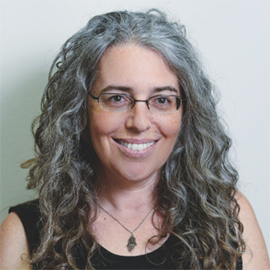 The focus of my work is in citizen science. In addition to my teaching, mentoring, and research, I have pioneered a Citizen Science Campus program at NC State. I am building the program to engage students and people across the state of North Carolina in volunteering for science, a system currently known as citizen science. I have made NC State the first Citizen Science Campus. I helped NC A&T get a grant to build capacity to also be a Citizen Science Campus. The program has several areas of focus: helping instructors incorporate citizen science experiences into their courses, helping residential villages offer citizen science experiences as service learning credits, working with libraries to loan citizen science equipment, and offering a Citizen Science Ambassador program in which undergraduates can gain research experiences, research credits, and apply work study hours. One advantage of the ambassador program is that it is available for students living at home during the pandemic. The Citizen Science Campus program has a weekly livestream show called “Make It Count Monday.” Each episode features a citizen science project, a guest from that project to discuss it and demo it. The undergraduate Citizen Science Club takes part too. Although the show started out as a way to engage students, there was interest from environmental educators. Now the show counts as continuing education credits for environmental educators certified by the state of NC Department of Environmental Quality. We partnered with SciStarter.org to have the digital infrastructure to help instructors and institutions keep track of the collective volunteer efforts, and help volunteers keep track of their own efforts too.
The focus of my work is in citizen science. In addition to my teaching, mentoring, and research, I have pioneered a Citizen Science Campus program at NC State. I am building the program to engage students and people across the state of North Carolina in volunteering for science, a system currently known as citizen science. I have made NC State the first Citizen Science Campus. I helped NC A&T get a grant to build capacity to also be a Citizen Science Campus. The program has several areas of focus: helping instructors incorporate citizen science experiences into their courses, helping residential villages offer citizen science experiences as service learning credits, working with libraries to loan citizen science equipment, and offering a Citizen Science Ambassador program in which undergraduates can gain research experiences, research credits, and apply work study hours. One advantage of the ambassador program is that it is available for students living at home during the pandemic. The Citizen Science Campus program has a weekly livestream show called “Make It Count Monday.” Each episode features a citizen science project, a guest from that project to discuss it and demo it. The undergraduate Citizen Science Club takes part too. Although the show started out as a way to engage students, there was interest from environmental educators. Now the show counts as continuing education credits for environmental educators certified by the state of NC Department of Environmental Quality. We partnered with SciStarter.org to have the digital infrastructure to help instructors and institutions keep track of the collective volunteer efforts, and help volunteers keep track of their own efforts too.
What does it mean to you to be named a University Faculty Scholar?
It is an honor to have one’s efforts acknowledged and recognized by being named a University Faculty Scholar. Being a scholar means that my peers and senior faculty are supportive of my work. Being named a University Faculty Scholar now, during the pandemic, is extra welcoming and motivating in a time of uncertainty and distractions.
How do you hope this designation will impact your teaching, research, leadership, etc.?
Being a UFS will impact all aspects of my work because it is a validation that my accomplishments so far are valued, and the directions I’m heading are on the right path.
Jason Coupet
Associate Professor, School of Public and International Affairs
College of Humanities and Social Sciences
2020-21 University Faculty Scholar
What is the focus of your work at NC State?
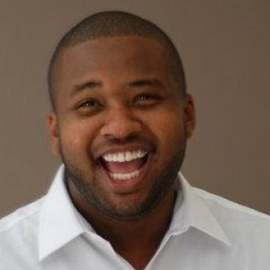
My primary research interests involve the efficiency and productivity of public service delivery. I work with public agencies, nonprofits, and community service organizations to use data and management science to improve and expand public service delivery, and to find productive ways to partner with each other. I am also interested in expanding opportunities for students, particularly those of color and working-class backgrounds, to learn to use data to improve and expand public services in their communities.
What does it mean to you to be named a University Faculty Scholar?
It’s quite an honor! When I first arrived at NC State, the University Faculty Scholars were among the faculty I admired the most!
How do you hope this designation will impact your teaching, research, leadership, etc.?
I’m most excited about the forthcoming scholarship in the School of Public and International Affairs. I’m hoping this encourages the NC State community to check out our upcoming research and teaching specializations in data analytics for public service. With the right moves, we could be national leaders integrating management science with public policy and public affairs.
Liara Gonzalez
Assistant Professor, Department of Clinical Sciences
College of Veterinary Medicine
2020-21 University Faculty Scholar
What is the focus of your work at NC State?
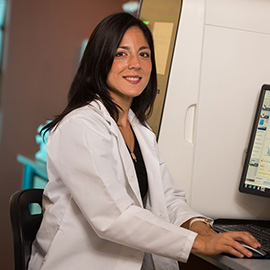 I was hired through the Dean’s Faculty Excellence Program in the College of Veterinary Medicine as part of the Gastrointestinal Cluster hire. I am a clinician scientist with commitments in the large animal hospital as a surgeon and am the principal investigator for the Intestinal Regenerative Medicine Laboratory. My research focuses on intestinal injury and repair, and the role of intestinal stem cells in this process. My long term goal is to develop new therapeutic interventions utilizing intestinal stem cells that can treat both human and veterinary patients. I have also been very involved in diversity and inclusion initiatives here at our college and across the NC State campus.
I was hired through the Dean’s Faculty Excellence Program in the College of Veterinary Medicine as part of the Gastrointestinal Cluster hire. I am a clinician scientist with commitments in the large animal hospital as a surgeon and am the principal investigator for the Intestinal Regenerative Medicine Laboratory. My research focuses on intestinal injury and repair, and the role of intestinal stem cells in this process. My long term goal is to develop new therapeutic interventions utilizing intestinal stem cells that can treat both human and veterinary patients. I have also been very involved in diversity and inclusion initiatives here at our college and across the NC State campus.
What does it mean to you to be named a University Faculty Scholar?
It is absolutely an honor to have that designation. I have worked very hard, and I have also received amazing mentorship here. I am committed to NC State, and this honor tangibly defines how NC State is committed to me as well. This also means a lot to my mentors, as it is a way to show their efforts in supporting me were worth it through my successes.
How do you hope this designation will impact your teaching, research, leadership, etc.?
The biggest impact I see this designation having will be on how I serve as a role model — that students at different levels can look and see someone who is Latina, who may look like them, or have a similar last name, who has achieved this designation. This validates the importance of mentorship and my efforts to continue to mentor students of all backgrounds. Just as I have been mentored — I strive to give back in the same way.
Elan Hope
Associate Professor, Department of Psychology
College of Humanities and Social Sciences
2020-21 University Faculty Scholar
What is the focus of your work at NC State?
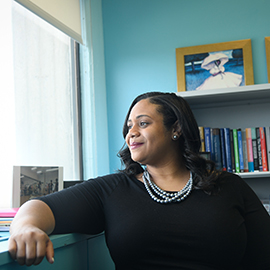 In my research, I study civic development, academic achievement, and health and well-being among racially marginalized youth, especially Black youth. I am especially interested in how adolescents and young adults understand our sociopolitical systems and how they seek to engage with those systems through activism and other types of civic engagement. In my lab, we also investigate how experiences in family and school can help youth reduce the negative effects of systems like racism, and promote positive youth development.
In my research, I study civic development, academic achievement, and health and well-being among racially marginalized youth, especially Black youth. I am especially interested in how adolescents and young adults understand our sociopolitical systems and how they seek to engage with those systems through activism and other types of civic engagement. In my lab, we also investigate how experiences in family and school can help youth reduce the negative effects of systems like racism, and promote positive youth development.
What does it mean to you to be named a University Faculty Scholar?
It is an honor to be named a University Faculty Scholar. Here at NC State, world-renowned scholars do groundbreaking research that matters to the lives of people and communities here in North Carolina. To be counted among those scholars is humbling and a blessing. This recognition helps me to continue to ask and answer questions to improve the lives of Black and Brown children in North Carolina and beyond.
How do you hope this designation will impact your teaching, research, leadership, etc.?
I hope that my new designation as a University Faculty Scholar will help me continue to do my research and teach our next generation leaders. I look forward to mentoring and teaching students in the latest research. And I look forward to collaborating with my colleagues to continue this important work.
Cathrine Hoyo
Professor, Department of Biological Sciences
College of Sciences
2020-21 University Faculty Scholar
What is the focus of your work at NC State?
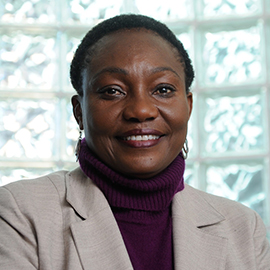
I teach a course entitled Statistics and Epidemiology in Global Public Health — 50 students enrolled last year. It provides a much needed course in those who are quantitatively inclined seniors who also have an interest in careers in medical allied health sciences. I also lead an epidemiologic research program on environmental exposures that contribute to adult-onset diseases such as cancer and vascular and metabolic heart diseases — our top killers that also disproportionately affect ethnic minorities. In this capacity, my team enrolls and follows human populations, collects specimens and questionnaire data to identify molecular and phenotypic prodromal effects and follows individuals for various outcomes throughout the life course. The ultimate goal is to find early detection markers that can be used clinically or in public health to alter the course of disease.
What does it mean to you to be named a University Faculty Scholar?
This recognition is an incredible honor, and it has breathed new life into my group as well.
How do you hope this designation will impact your teaching, research, leadership, etc.?
I am hoping this honor will serve at least two purposes. One is to encourage undergraduates interested in medical and allied health sciences careers to consider taking the 400-level class and participate in research. Given the work involved in human subjects research, undergraduate students are hired by our lab to conduct various research activities, which provides much needed experience for many of our undergraduates. The second is to attract graduate students with an interest in transdisciplinary research.
Kim Allen
Associate Director of Academic Programs
College of Agriculture and Life Sciences
2019-20 University Faculty Scholar
What is the focus of your work at NC State?
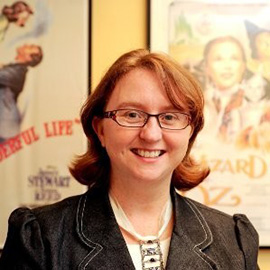 My faculty role at NC State has focused on family science. My research, teaching, and extension programs all revolved around the central question of how do we help families thrive? The majority of my work fell into two arenas; supporting professionals that worked directly with families and creating best practices for teaching family science online. In my first role, I was able to create programs and organizations that supported the professional development of direct service providers like parent coaches and family life educators. One example of that role was in the creation of a professional development organization, the Family Life Coaching Association, a non-profit that works to elevate the field of family science, specific coaches helping families. In my other role, I was able to research and put into practice effective approaches to teaching family science online. This meant everything from online graduate education to online parenting modules for teen parents. Knowing that families need support and often look to online resources was a major motivating factor in my work. I have recently moved to the College of Agriculture and Life Sciences’ Academic Programs Office where I get to continue my work in supporting student excellence.
My faculty role at NC State has focused on family science. My research, teaching, and extension programs all revolved around the central question of how do we help families thrive? The majority of my work fell into two arenas; supporting professionals that worked directly with families and creating best practices for teaching family science online. In my first role, I was able to create programs and organizations that supported the professional development of direct service providers like parent coaches and family life educators. One example of that role was in the creation of a professional development organization, the Family Life Coaching Association, a non-profit that works to elevate the field of family science, specific coaches helping families. In my other role, I was able to research and put into practice effective approaches to teaching family science online. This meant everything from online graduate education to online parenting modules for teen parents. Knowing that families need support and often look to online resources was a major motivating factor in my work. I have recently moved to the College of Agriculture and Life Sciences’ Academic Programs Office where I get to continue my work in supporting student excellence.
How has your designation as a University Faculty Scholar impacted your teaching, research, leadership, etc.?
It is an honor to have the University Faculty Scholar designation. When I look at my esteemed colleagues with that title, I feel such a sense of honor and pride. To be honest, the day to day work didn’t change all that much; my teaching, research, and extension work pretty much continued without a change. What I think this designation helps with is feelings of worth and opportunities. I have been able to move into an administration role and while the designation wasn’t the only reason, I do think it probably helped.
What advice do you have for new University Faculty Scholars?
I would encourage new scholars to keep doing what they do as it is clearly working! One other thing I might add is that balance and health are critical; be sure to carve out time for family life and joyful activities.
Gavin Williams
Professor, Interim Department Head, Department of Chemistry
College of Sciences
2015-16 University Faculty Scholar
What is the focus of your work at NC State?
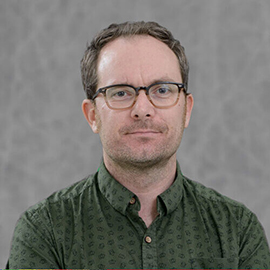
My research group uses synthetic biology to facilitate access to new-to-nature chemicals for drug discovery and development.
How has your designation as a University Faculty Scholar impacted your teaching, research, leadership, etc.?
The University Faculty Scholar funds allowed the research group to try new experiments and explore new research directions that traditional funding mechanisms wouldn’t necessarily allow.
Sankar Arumugam
Professor, Department of Civil, Construction and Environmental Engineering
College of Engineering
2013-14 University Faculty Scholar
What is the focus of your work at NC State?
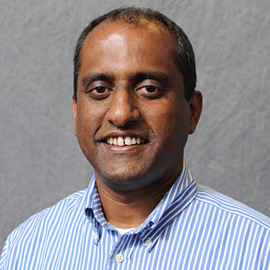
My primary research focus is to understand, quantify and predict the stresses on the environmental systems – water, energy and ecology – under changing climate and human influences, and then designing sustainable solutions to address these stresses. Our research group focuses on various NSF-funded projects that combine hydroclimatic forecasts/projections for improving infrastructure management at various time scales. We also focus on synthesis of hydroclimate, energy and ecological observed/modeled datasets to understand the signature of human and climate influences on environmental systems. This synthesis eventually provides critical information on the drivers of changes in human-environmental systems, thereby they provide a priori information for incorporating those changes into physical/stochastic/system models for improving infrastructure management.
How has your designation as a University Faculty Scholar impacted your teaching, research, leadership, etc.?
Certainly having university recognition is a plus. It certainly provided additional cushion for travel during my sabbatical. This helped me to establish collaborative research with the U.S. Geological Survey National Center in Reston, Virginia, and this collaboration will help me for the years to come. I certainly feel this recognition is expected to yield career advances.
What advice do you have for new University Faculty Scholars?
I would call it a suggestion. Be bold; be transformative. Embrace problems through which you can make an impact on the society. Encourage your graduate students to collaborate with other scientists/collaborators in the field so that they develop a more diverse thinking in problem solving.
This post was originally published in Provost's Office News.